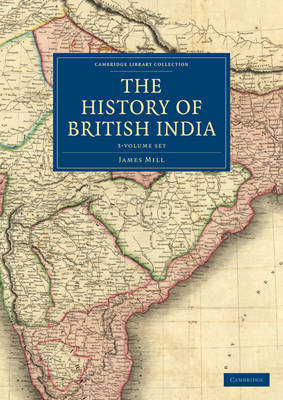Cambridge Library Collection - South Asian History
3 primary works • 4 total works
Volume 1
James Mill's three volume History of British India was published from 1817 to 1818 and became an immediate success. A friend of Jeremy Bentham and a follower of utilitarianism, Mill focuses more on historical processes than human interest. He uses extensive sources rather than first-hand experience to create, as his preface claims, an 'objective' yet 'critical' history, often making harsh judgements of the country and its people within the context of a wider theoretical framework. He also criticises the British involvement in India and the process of conquest, colonization, and administration, the intention being to encourage the reader to a greater understanding of historical processes, ideas, and institutions with a view to encouraging thorough reform. Volume 1 examines the history from first encounters of the British in India to the formation of the Honourable East India Company in 1708, with studies of the Hindu and Muslim people and religions.
Volume 2
James Mill's three volume History of British India was published from 1817 to 1818 and became an immediate success. A friend of Jeremy Bentham and a follower of utilitarianism, Mill focuses more on historical processes than human interest. He uses extensive sources rather than first-hand experience to create, as his preface claims, an 'objective' yet 'critical' history, often making harsh judgements of the country and its people within the context of a wider theoretical framework. He also criticises the British involvement in India and the process of conquest, colonization, and administration, the intention being to encourage the reader to a greater understanding of historical processes, ideas, and institutions with a view to encouraging thorough reform. Volume 2 covers the period from the establishment of the Honourable East India Company in 1708 to East India Company Act of 1773, and from this to Pitt's India Act of 1784.
Volume 3
James Mill's three volume History of British India was published from 1817 to 1818 and became an immediate success. A friend of Jeremy Bentham and a follower of utilitarianism, Mill focuses more on historical processes than human interest. He uses extensive sources rather than first-hand experience to create, as his preface claims, an 'objective' yet 'critical' history, often making harsh judgements of the country and its people within the context of a theoretical framework. He also criticises the British involvement in India and the process of conquest, colonization, and administration, the intention being to encourage the reader to a greater understanding of historical processes, ideas, and institutions with a view to encouraging thorough reform. Volume 3 examines the history of the colony from Pitt's India Act in 1784 to the end of the Second Anglo-Maratha War and the peace between the British and Maharaja Yashwantrao Holkar in 1805.
James Mill's three volume History of British India was published from 1817 to 1818 and became an immediate success. A friend of Jeremy Bentham and a follower of utilitarianism, Mill focuses more on historical processes than human interest. He uses extensive sources rather than first-hand experience to create, as his preface claims, an 'objective' yet 'critical' history, often making harsh judgements of the country and its people within the context of a wider theoretical framework. He also criticises the British involvement in India and the process of conquest, colonization, and administration, the intention being to encourage the reader to a greater understanding of historical processes, ideas, and institutions with a view to encouraging thorough reform.

